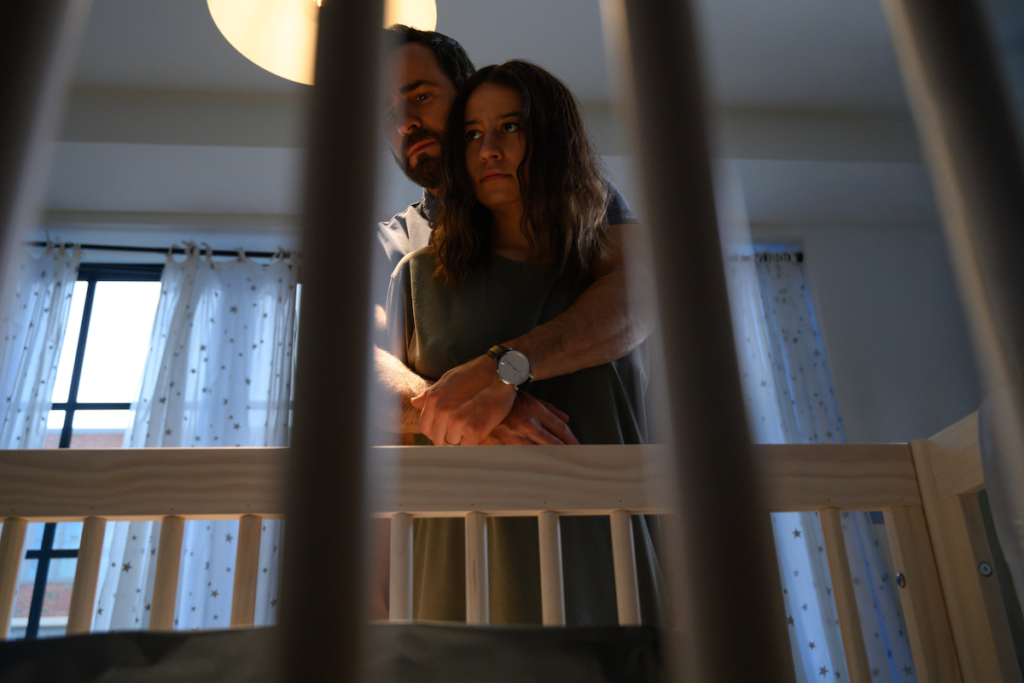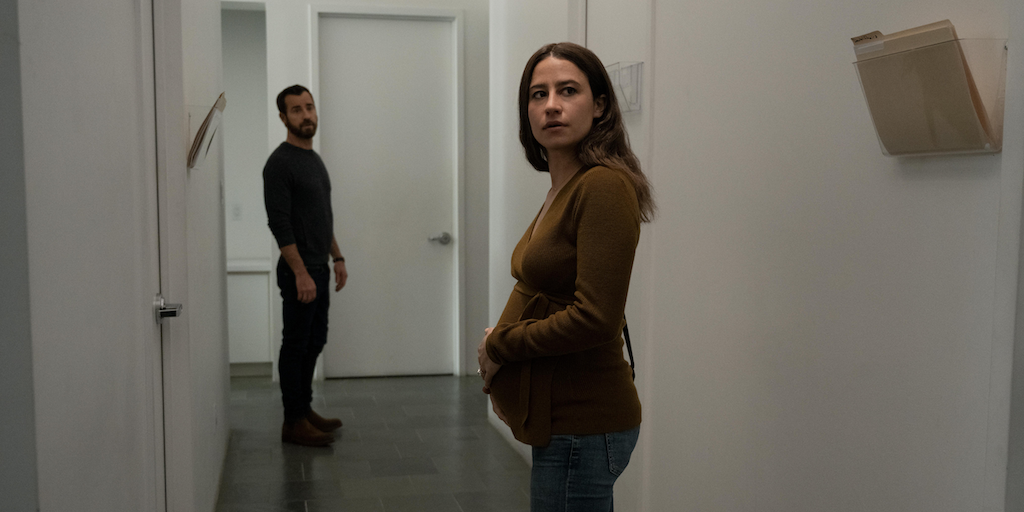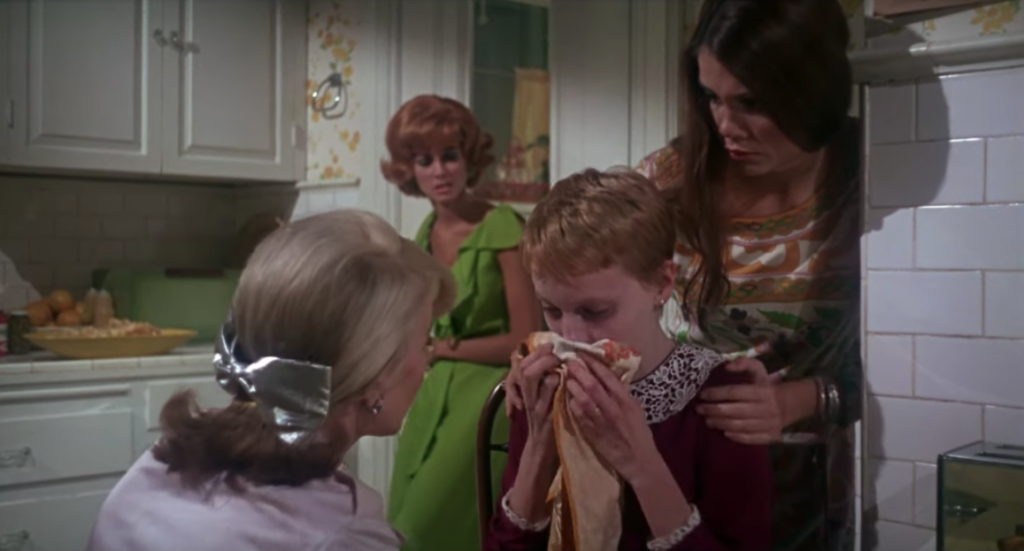The Scariest Thing About False Positive is How Wrong It Gets Infertility
In the first moments of False Positive, it initially seems as if A24’s new infertility horror film knows exactly who it’s talking to. Rosemary’s Baby, with which it clearly shares narrative DNA, is the story of a hapless, fertile young woman who has the misfortune of being raped by the devil and carrying his progeny to term in a miserable pregnancy—but Rosemary was always going to get a baby. When wannabe mother Lucy (Ilana Glazer) morosely hands her husband Adrian (Justin Theroux) another negative pregnancy test and says, “This is the one thing I’m supposed to be good at,” it’s a familiar refrain for infertile women. We see you, the movie seems to address the 1-in-8 who don’t understand how going off birth control, limiting alcohol and caffeine, and doing the deed at the right time every month doesn’t reliably produce a pregnancy. Unlike poor Rosemary Woodhouse (Mia Farrow), Lucy is a woman who has more obstacles than just wondering what’s in her womb—first she has to get to the point of even carrying potential demon spawn.
And while False Positive cleverly engages with the monstrous rape and gaslighting of Rosemary’s Baby from a twenty-first-century perspective, basing its dark premise on infertility feels nearly as misleading as the disingenuous Hindle Women’s Center itself—that is, the reproductive technology clinic that promises Lucy her “fairy tale ending.” Both for Lucy and for horror fans who wish to be mothers, the effect is instead nightmarish.
This piece contains spoilers for False Positive.
Modern horror revolving around pregnancy and postpartum depression often focuses on the body horror of actually growing another skeleton inside you, or the creeping uncertainty of a new mother who can’t trust her own altered brain chemicals. Yet infertility is its own brand of isolation: fear that your body isn’t working the way it’s “supposed to”; terror that you will drain your savings and ruin your marriage for the mere chance of IVF working; trepidation that you might have to rewrite an entirely different future for yourself.
As someone who has spent the past two years struggling with this slow-mounting dread-to-despair, I’ve grasped for fictional narratives that actually get it. Brooklyn Nine-Nine and Master of None had some progressive plotlines, yet it’s Ali Wong’s 2016 comedy special Baby Cobra that best hits upon the heart-thudding anxiety of trying to conceive, with a darkly funny anecdote featuring surprise twins, miscarriage, and Beyoncé. I imagined that screenwriter and star Glazer, best known for similarly fearless forays into the cis female body in Broad City, and who was pregnant when False Positive was released, would have also found a way to strike black comedy gold.

There are specific moments and choices that reveal how much thought Glazer and co-writer/director John Lee put into this story. The early sequences in which Lucy submits to a battery of infertility testing cast her as this beatific creature: limbs arranged just so and mouth prodded open, simultaneously dulled to these indignities while trying to dredge up hope about trying again with famed babymaker Dr. Hindle (Pierce Brosnan). Later, the scenes shooting Lucy upside-down in stirrups both conjure up inverted crosses and further dehumanize her, turning her more into a profane vessel as it becomes clear that Hindle’s experimental methods might have conceived something diabolical. The film’s frequent use of mirrors amp up Lucy’s and the viewers’ paranoia, depicting how doctor and patient, husband and wife, lie to each other’s faces; furtive glances into darkened corridors are the aesthetic opposite of the demonic intentions lurking in the whitewashed walls of the Bramford.
Yet for a film where the audience already knows to doubt Lucy’s supposed miracle pregnancy, False Positive misrepresents the experience of infertility, and especially IVF, to a horrific extent. The movie plays fast and loose with medical terminology, which is to be expected when streamlining for plot purposes, but this narrative handwaving reveals how ill-equipped Lucy is to understand what has been done to her own body. Because Dr. Hindle misleads Lucy to believe his process is a form of IVF (in vitro fertilization), that’s the language that she uses when she becomes pregnant—despite not undergoing IVF the way her fellow infertile moms like Corgan (Sophia Bush) do. (There was a lost opportunity to explore why Lucy, feeling guilty for having gotten it on the first try, might have downplayed her relative good fortune in favor of commiserating with fellow moms-to-be.)
The awful dilemma that Lucy and Adrian do face involves conceiving too many children: with Lucy carrying twin boys and a singleton girl, they must decide on a selective reduction, to remove one of the two amniotic sacs. While Hindle and Adrian push for the healthier boys, Lucy has always envisioned her daughter Wendy, so she decides to keep the girl. But when she suffers dark, heavy bleeding afterwards, Hindle dismisses it as OHSS, or ovarian hyperstimulation syndrome—a term that might pass unnoticed unless you’re an infertile viewer like me who was screaming. It would be quite the achievement for Lucy to have OHSS, considering she did not do IVF; even worse, Hindle lies to her face that it’s her uterus stretching, when “ovary” is right there in the name.
Poor Rosemary is not entirely the naïve lamb led to slaughter; she questions every strange aspect of her pregnancy and even goes so far as to pick up a pregnancy book for research. However, that only earns her a patronizing talking-to from Dr. Sapirstein, who’s in on the Satanic plot; otherwise, her concerned girlfriends can’t do much more than reassure her that this is not normal. It’s not Rosemary’s fault that in 1965 husbands and doctors alike dismiss a pregnant woman’s neuroses. But Lucy is a Millennial with access to the Internet—not just through her marketing job, but the everyday ability to open up Reddit on her phone and read millions of other women’s lived experiences.
But do you mean to tell me that this bitch has been trying to conceive for two years and doesn’t know the difference between her ovaries and her uterus? That she has not absorbed any of these acronyms and just takes them from Hindle as docilely as his prescribed pills? His scolding condescension about not believing what she might read on the Internet directly echoes Sapirstein lecturing Rosemary about trusting any expertise outside the confines of the doctor’s office. But whereas it’s obvious to those watching Rosemary’s Baby that this is no normal pregnancy, the majority of False Positive’s audience does not have that same context.
False Positive promised a modern mother empowered with the confidence to question what was happening to her and actually challenge it. But when the storytellers incorrectly engage with an experience that affects millions of women, stripping Lucy of any knowledge and thus agency even before conception, it becomes a tired rehash of the horror trope of withholding key information from female characters. Hindle and Sapirstein controlling their patients’ access to information is no different from hiding away the Final Girl without telling her that the killer has escaped prison and is on his way to her, or that there is one key piece of information or a weapon she can use to defeat him once and for all. Those scenarios are often mistakenly meant to protect the woman’s safety; but when the doctors have evil agendas, the pregnant women need to be able to trust their instincts.
The smartest yet simultaneously most underutilized aspect of the film is that Lucy’s blood-soaked dreams and supposed premonitions are actually her subconscious trying to alert her to what’s wrong. She sees demonically twisted faces on ultrasound and dreams a daughter straight out of The Omen, but there is nothing evil about the fetuses she’s carrying—only their provenance. Even her more surreal nightmares in which Adrian and John carry on a steamy affair under her nose are a metaphor for their secret partnership, in which her husband bargained her womb for his job. (At least it gets that right—pregnancy dreams are wild, man.)
False Positive’s twist is the banal, misogynistic horror of an egotistical man who believes that he should control every aspect of reproduction, and that the only worthwhile babies are the ones he fathers. It’s the stranger-than-fiction account of a fertility doctor who swaps his own sperm for the husband’s, which was shocking when it broke as a news story years ago, and arrives in 2021 as a watered-down revelation.

Such a shame that Lucy was the perfect protagonist for this movie, as an infertile woman who has spent two years doubting every aspect of herself. It would have been easier—far easier than with fertile, tremulous Rosemary—to gaslight Lucy by having her doctor and husband and fellow mamas scold her for looking for something wrong, after twenty-four months of things not going right. Instead, she gets infantilized with dismissals of “mommy brain” and “pre-partum depression” in the same fashion as Rosemary with her “pre-partum crazies.” Instead, as it becomes clear that everyone in her life is united in a conspiracy to keep her calm until the birth, Lucy has no choice but to turn monstrous, screeching like a Final Girl and futilely trying to exert power over her pregnancy in its final weeks.
She doesn’t give birth to the devil, but it is still wrong: Lucy discovers, in a twist on the usual “surprise twin” delivery scene, that Hindle terminated Wendy and kept the boys. (My initial read was that Wendy was Adrian’s and the twins Hindle’s, but it’s just more misogyny—Hindle wants the boys to spread his seed, shudder.) So not only has Hindle (with Adrian’s permission) raped her, but the two men decided which babies got to live and let her spend her pregnancy with embroidered onesies and first-edition Peter Pans daydreaming with her mommy brain over a future that was already extinguished.
False Positive’s brutal final act, in which Lucy finally delivers the afterbirth of blood and rage from her dreams into real life, should be a mother’s justified vengeance. But because of the narrative blunders leading up to Lucy’s showdown with Hindle, it veers straight into camp. Glazer’s humor does slyly peek through in these small, dark moments, like when Lucy chokes Hindle’s annoyingly perky head nurse Dawn (Gretchen Mol) using the transvaginal wand that many a Redditor has nicknamed “Wanda.” How many IVF patients who have twice-weekly morning appointments with Wanda for months on end have either become so dulled to the “twanding” or still dread it anew, that it easily transforms into a weapon? Yet winking bits like this are too little, too late.

The lasting horror of Rosemary’s Baby is how, at the end, she accepts her role: demon-spawn Adrian (!) needs a mother, and even beyond the act of birthing him, she’s the Satanic coven’s only option to breastfeed and play the nurturing caretaker. Despite herself, Rosemary lets herself be drawn in by her child’s inhuman eyes and whatever human elements she unwittingly contributed, because after all, more than anything she wanted to be a mother.
Lucy shares Rosemary’s initial rejection of this child who is technically hers but whose conception was a violation—but, in violent contrast, actually carries it through. After an unsettling sequence in which she imagines gently sending the twins out the window like the Darling children soaring off to Neverland, she instead hands them to Adrian and screams at him to go—burdening him with fatherhood he never anticipated.
Another missed opportunity in False Positive was to really interrogate what kind of man—the same for Guy (John Cassavetes) in Rosemary’s Baby—would gladly turn himself into a cuckold in favor of career advancement. Both actor Guy, finally getting his big break on the stage, and surgeon Adrian, fulfilling his long-wished-for dream of joining John in his medical practice, would rather inhabit these roles gained through illicit means than actually be biological fathers.
Having neatly excised her-but-not-hers offspring from her life, Lucy sits with the child she wanted all along: the corpse of 12-week-old Wendy, who she hallucinates (we hope) stirring and feeding at her breast. Even if the child she wanted is dead and the children she didn’t want are out of her life, Lucy has become a mother. Whether she gets to become a mother again to a living child conceived entirely through her control, knowledge, and consent is an unanswered question, but one that the movie’s most valuable audience likely won’t stick around to wait for the answer.
False Positive is available via Hulu.
Rosemary’s Baby is available via Amazon, Hulu, Starz, Google Play, Apple, YouTube, Vudu, and elsewhere.





